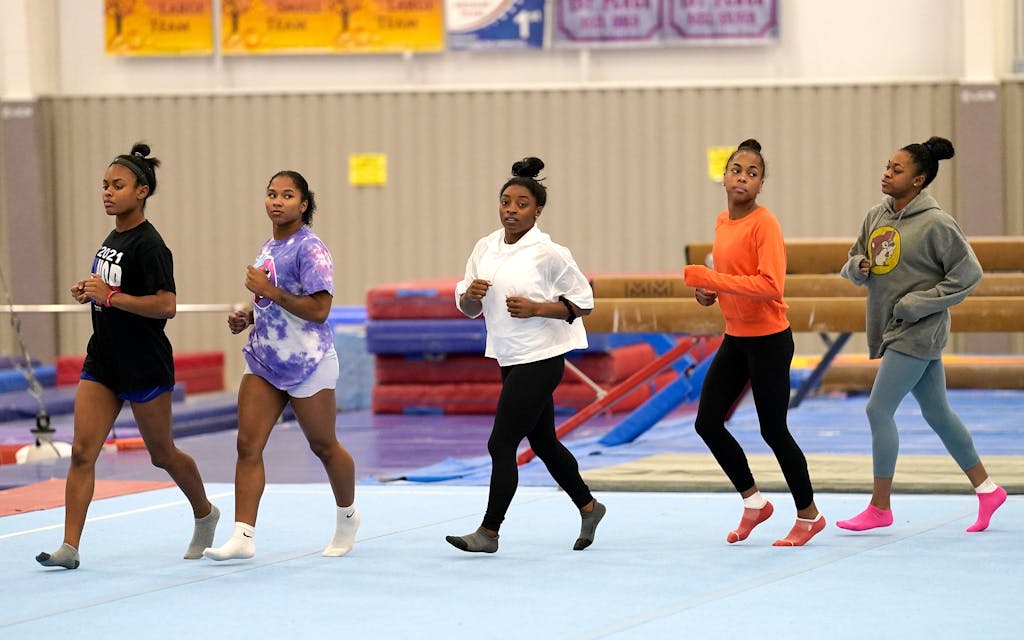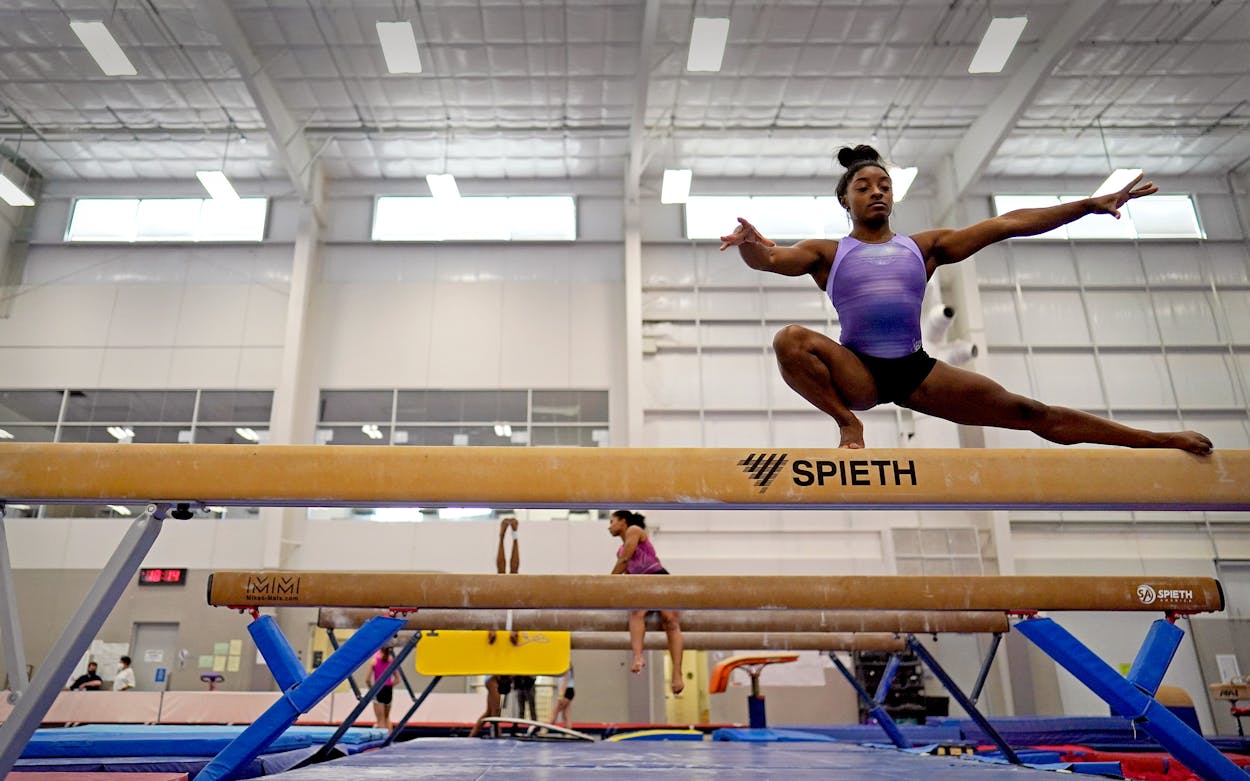The center of the gymnastics universe is a large beige building that resembles a suburban middle school. The 52,000-square-foot World Champions Centre sits just off the Grand Parkway toll road in the town of Spring, a half hour’s drive north of Houston. On a recent rainy afternoon, cars queued outside the entrance to drop off children for a range of classes that includes everything from traditional gymnastics to tae kwon do to American Ninja Warrior. Kids of all ages and colors, wearing leotards or martial arts uniforms, came spilling out of back seats and into the sprawling facility.
After five years of public operation, World Champions Centre now trains hundreds of Houston-area gymnasts. But it was built for one gymnast in particular: Simone Biles. Perhaps you’ve heard of her. From the ages of six to sixteen, Biles trained at Bannon’s Gymnastix, the north Houston gym where she met her longtime coach Aimee Boorman. By the time she won her first all-around gold medal at the 2013 World Artistic Gymnastics Championships, though, it was becoming clear to everyone that Biles had outgrown the gym. So Biles’s parents, Ron and Nellie, built her a new one.
“Bannon’s just wasn’t able to do the things that Simone needed to continue on her path to the Olympics,” said Jessica O’Beirne, host of the popular GymCastic podcast. “Nellie has a lot of business experience, and she was willing to build a gym. Aimee helped design it.” The gym opened in a temporary space in 2014 before moving to its permanent home, and opened to the public in 2016. (Simone, Nellie, and Ron declined interviews for this story, citing the proximity of the Tokyo Olympics. Boorman, who no longer coaches Simone and now works for the Dutch women’s gymnastics team, did not respond to a request for comment.)
The decision proved prescient: Biles’s dominant performance at the 2016 Summer Olympics in Rio de Janeiro made her an international superstar, and competitive gymnasts from around the country flocked to Spring to train alongside her. Out of the eighteen women gymnasts who competed in the U.S. Olympic trials in June, four train at World Champions Centre—the most from any gym in the country. Two of the six gymnasts who will represent Team USA in Tokyo, Simone Biles and Jordan Chiles, call the gym their home. “Simone has attracted these amazing athletes from all over the country,” O’Beirne said. “It’s rare for a gym to have one elite athlete. It’s even more rare for a gym to have multiple elite athletes.”

World Champions Centre has assumed even greater importance in the wake of the scandals that have roiled USA Gymnastics, the sport’s national governing body, for the past five years. In 2017, Larry Nassar, the team’s national medical coordinator from 1996 to 2014, pleaded guilty to multiple counts of sexual assault; he is believed to have sexually abused as many as 265 female gymnasts under the guise of providing medical treatment. In 2018, Biles revealed that she too was a survivor of Nassar’s abuse. Much of that abuse occured at the Károlyi Ranch in Huntsville, an hour north of Spring. Operated by Romanian émigrés Béla and Márta Károlyi, the ranch was the official training center of U.S. women’s gymnastics from 2001 until January 2018, when USA Gymnastics cut ties with it following an anguished statement by Biles. A facility in Indianapolis was chosen as Team USA’s interim training headquarters, but with the governing body tainted by its failure to stop Nassar’s sexual abuse, Biles has become the sport’s new moral authority.
That authority is embodied by World Champions Centre, which was designed from the ground up to maximize safety and transparency. While some gyms discourage parents from attending practice, the Biles family built an observation room overlooking the gym floor and encouraged parents to watch. All parts of the gym are clearly visible to observers, making it difficult to hide abusive coaching. Following Biles’s amicable split from Boorman, the four-time gold medalist hired French couple Laurent and Cecile Landi to be her new coaches and to work with the gym’s other elite athletes. The Landis have a reputation for being as compassionate as they are rigorous—a big contrast to the authoritarian style of the Károlyis.
“Some gyms are dingy and dark, and have all this unsafe equipment,” O’Beirne said. “That gym is beautiful; it’s state-of-the-art.” Robert Andrews, a Houston-based sports psychology coach who worked with Biles for several years, said that Biles having her own gym was a “huge advantage.” “Coaching is getting better in the sport, but I still see a lot of gymnasts who are not treated the right way, some of them abusively. Some of them will drive hours to a gym to be abused. At World Champions Centre, the Bileses get to decide the culture. They can handpick who they want to come in and be part of that culture. It doesn’t get any better than that.”
Rebecca Schuman, who covers gymnastics for Slate, said World Gymnastics Centre is one of the few gyms she would be comfortable sending her children to. “Because it’s owned by the Bileses, you know it’s going to be a safe environment for athletes and their parents,” she said. “Simone Biles has just been such a tireless advocate for athlete safety since the horrible events that USA Gymnastics allowed to happen to her cohort.”
The fact that World Champions Centre is one of the few Black-owned and -operated elite gyms in the country—plus, of course, the presence of Simone Biles—has also made it a mecca for Black gymnasts like Chiles, who moved from her hometown of Vancouver, Washington, to train in Spring. “Since Chiles arrived at the gym, she’s become a different gymnast,” Schuman said. “She’s always had the power, she’s always had the ability, but she just never quite had it all dialed in.”
Black gymnasts face a unique set of challenges, said Derrin Moore, a gym owner and the founder of Brown Girls Do Gymnastics, an Atlanta-based organization that advocates for diversity in the sport. Gymnastics coaches, officials, and judges are overwhelmingly white, and the sport has a history of discrimination against Black gymnasts. “In gymnastics, Black bodies are generally more powerful,” Moore said. “So you hear things like, ‘It’s not artistic’; ‘She’s not graceful.’ People can’t get over the fact that you see more muscle.”
Other issues can also make non-white gymnasts feel uncomfortable. The official USA Gymnastics rule book states that athletes must have their “hair secured away from the face so as not to obscure [their] vision of the apparatus.” White gymnasts traditionally tie their hair into a slick ponytail or bun, but that isn’t always possible for Black girls. “Black and brown gymnasts have textured hair,” Moore said. “We don’t get slick hair unless it’s chemically processed. As a gym owner, I tell my girls that the bun can be an Afro puff, or you can cornrow your hair—just as long as it’s all moving in the same direction [when performing a skill].” Then there’s all the chalk needed for gymnastics, which shows up more against dark skin. When she was a gymnast, Moore would make special trips to the bathroom to wash the chalk off her legs.
Within just a few years, World Champions Centre has established a reputation as a center for Black gymnastic success. “To have a gym at this level, with this many elite Black women together, hasn’t ever really happened before,” O’Beirne said. “It’s really revolutionary, and it’s been wonderful to see.” The camaraderie among the gym’s athletes has been on display at recent meets. Throughout the Olympic trials in June, Biles could be seen encouraging Chiles after her routines—and both ended up making the team. At the U.S. Championships in Fort Worth in June, NBC’s cameras caught Biles lovingly tying a silver ribbon around the Afro puff of fifteen-year-old Zoe Miller, who trains at World Champions Centre.
For viewers like Schuman, the moment encapsulated what Biles and her gym represent for the future of American gymnastics. “They’re saying, ‘Black excellence is a thing. And we’re it.’”
- More About:
- Sports
- Olympics
- Simone Biles
- Houston








